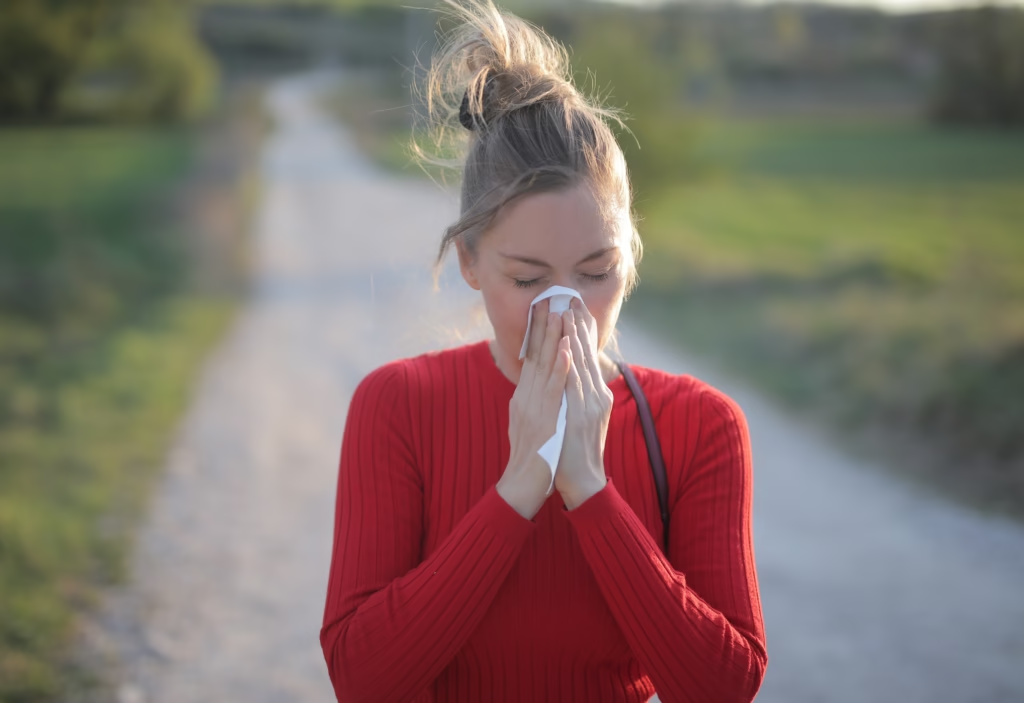Introduction:
Seasonal allergies are among the most common health concerns worldwide, affecting millions of people each year. While they may not be life-threatening, they can significantly interfere with daily life by causing persistent sneezing, congestion, itchy eyes and fatigue. Understanding seasonal allergies, seasonal allergy symptoms and available treatments can help you manage the condition effectively and improve your quality of life.
What Are Seasonal Allergies?
Seasonal allergies, also known as hay fever or allergic rhinitis, occur when your immune system overreacts to allergens such as pollen, grass, weeds or mold spores that are more prevalent during specific times of the year. Unlike food allergies or drug allergies, seasonal allergies appear only during allergy season, the period when these allergens are at their peak.

When Is Allergy Season?
Allergy season can vary depending on your region and climate. In general:
- Spring (March – May) – Tree pollens such as oak, birch, cedar and maple are the most common triggers.
- Summer (June – August) – Grass pollen dominates during this period.
- Fall (September – November) – Weeds such as ragweed, sagebrush, and mugwort release pollen, making autumn a challenging season.
- Winter (December – February) – Outdoor allergens are less common, but indoor allergens like mold, dust mites, and pet dander may worsen symptoms.
Knowing when is allergy season in your area is key to preparing ahead of time.
Common Seasonal Allergy Symptoms
The intensity of seasonal allergy symptoms can vary from mild to severe. The most common include
- Sneezing and nasal congestion
- Runny or stuffy nose
- Itchy or watery eyes
- Postnasal drip
- Coughing and sore throat
- Sinus pressure or headaches
- Fatigue and difficulty concentrating
- Skin reactions such as hives (less common)
Since these symptoms often mimic a cold or sinus infection, many people confuse them with viral illnesses. The main difference is that seasonal allergies usually last as long as you are exposed to the allergen and are not accompanied by fever.
Causes and Triggers of Seasonal Allergies
The primary cause of seasonal allergies is exposure to pollen. However, several other triggers may worsen symptoms, including
- Mold spores in damp environments
- Air pollution and smog
- Dust mites and pet dander (especially indoors)
- Strong fragrances or chemical irritants
- Weather changes windy days spread pollen faster
Your genetic makeup can also play a role as seasonal allergies often run in families.
How Are Seasonal Allergies Diagnosed?
If you experience seasonal allergy symptoms every year during a particular season, it is a strong indication that you have allergic rhinitis. To confirm, a doctor may recommend:
- Allergy testing (skin prick test or blood test) to identify specific allergens.
- Symptom tracking to determine when and where flare-ups occur.
- Physical examination to rule out infections or sinus problems.
Seasonal Allergy Treatment Options
Managing seasonal allergies involves a combination of prevention and medical treatment. Some of the most effective seasonal allergy treatment options include:
- Antihistamines – reduce sneezing, itching and runny nose.
- Decongestants – relieve nasal congestion and sinus pressure.
- Nasal corticosteroid sprays – reduce inflammation in the nasal passages.
- Eye drops – relieve red, itchy or watery eyes.
- Allergy shots (immunotherapy) – recommended for severe cases when medications are not enough.
It is always best to consult a doctor before starting treatment, especially if you have underlying conditions such as asthma.
Natural Remedies for Seasonal Allergies
While medications are highly effective, some people prefer natural remedies for allergies as a complementary approach. These include:
- Saline nasal rinses to clear allergens from nasal passages.
- Steam inhalation to relieve congestion.
- Local honey (though not scientifically proven, some people believe it helps build tolerance to pollen).
- Vitamin C and quercetin-rich foods such as citrus fruits, onions, and apples, which may act as natural antihistamines.
- HEPA air filters to reduce indoor allergens.
- Essential oils like eucalyptus or peppermint (inhalation may ease breathing).
Always consult your healthcare provider before relying solely on natural treatments, especially if your symptoms are moderate to severe.
Lifestyle and Prevention Tips
Reducing your exposure to allergens can make a big difference. Here are some tips
- Keep windows closed during peak pollen season.
- Shower and change clothes after being outdoors.
- Use air conditioning instead of natural ventilation.
- Wash bedding frequently in hot water.
- Avoid outdoor activities during early morning and evening when pollen levels are highest.
- Wear sunglasses outdoors to reduce pollen contact with eyes.
Long-Term Outlook
Seasonal allergies are usually manageable but may persist throughout life. With the right combination of treatment and preventive measures, most people can reduce their symptoms significantly and enjoy a better quality of life.
Frequently Asked Questions:
- What causes seasonal allergies?
Seasonal allergies are caused by pollen from trees, grasses, weeds and mold spores that trigger the immune system. - When is allergy season the worst?
It depends on your region. In many areas, spring and fall are the most challenging times due to tree and weed pollen. - Can seasonal allergies cause fever?
No, seasonal allergies do not cause fever. If you have a fever, it is more likely an infection such as a cold or flu. - Are seasonal allergies the same as hay fever?
Yes, hay fever is another term for seasonal allergic rhinitis. - How can I tell if I have a cold or seasonal allergies?
Colds last 7 to 10 days and often include fever and body aches. Seasonal allergies last longer and mainly involve sneezing, runny nose and itchy eyes. - Can allergies turn into asthma?
In some cases, untreated allergies may worsen asthma symptoms or increase the risk of developing asthma. - What foods can help reduce seasonal allergy symptoms?
Citrus fruits, leafy greens, ginger, turmeric and foods high in omega-3 fatty acids may help reduce inflammation. - Can children develop these allergies?
Yes, seasonal allergies can develop at any age and children are just as likely to be affected as adults. - Are there long-term cures for seasonal allergies?
There is no absolute cure but immunotherapy (allergy shots) can provide long-term relief. - Do natural remedies for seasonal allergies really work?
They can help reduce symptoms but are usually most effective when combined with medical treatments.
Conclusion:
Seasonal allergies are a common but manageable health condition. By understanding seasonal allergy symptoms, when is allergy season, treatment options and natural remedies for seasonal allergies, you can take proactive steps to reduce their impact. From medications and allergy shots to lifestyle changes and natural remedies, many strategies are available to help you breathe easier and enjoy every season.














